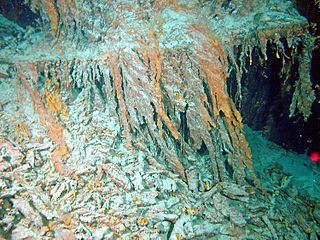Related Research Articles
The Brevundimonas are a genus of bacteria. They are Gram-negative, non-fermenting, aerobic bacilli. The Brevundimonas species are ubiquitous in the environment but are rarely isolated from clinical samples., although numbers are increasing. Two species of Brevundimonas originally classified under the genus Pseudomonas have been re-classified by Seger et al. as Brevundimonas vesicularis and Brevundimonas diminuta.

Enterobacter cloacae is a clinically significant Gram-negative, facultatively-anaerobic, rod-shaped bacterium.

Halomonas titanicae is a gram-negative, halophilic species of bacteria which was isolated in 2010 from rusticles recovered from the wreck of the RMS Titanic. It has been estimated by Henrietta Mann, one of the researchers that first isolated it, that the action of microbes like Halomonas titanicae may bring about the total deterioration of the Titanic by 2030. While the bacteria have been identified as a potential danger to oil rigs and other man-made objects in the deep sea, they also have the potential to be used in bioremediation to accelerate the decomposition of shipwrecks littering the ocean floor.
Brevundimonas aveniformis is a gram-negative, rod-like, stalk-producing bacterium belonging to the genus Brevundimonas.
Angustibacter luteus is a bacterium from the genus of Angustibacter which has been isolated from subarctic forest soil.
Angustibacter peucedani is a Gram-positive and strictly aerobic bacterium from the genus of Angustibacter which has been isolated from rhizospheric soil from the plant Peucedanum japonicum from Mara Island in Korea.
Brevundimonas abyssalis is a Gram-negative, alkali tolerant, psychrotolerant, aerobic, dimorphic prosthecate and heterotrophic bacterium from the genus of Brevundimonas which has been isolated from deep-sea floor sediments from Japan.
Brevundimonas albigilva is a Gram-negative, aerobic and short rod-shaped bacterium from the genus of Brevundimonas which has been isolated from forest soil from the Kyonggi University in Korea.
Brevundimonas balnearis is a bacterium from the genus of Brevundimonas which has been isolated from well water from the Gellért thermal bath in Hungary.
Brevundimonas basaltis is a Gram-negative, aerobic, rod-shaped and motile bacterium from the genus of Brevundimonas which has been isolated from black sand from Soesokkak in Korea.
Brevundimonas canariensis is a bacterium from the genus of Brevundimonas which has been isolated from roots of the plant Triticum aestivum from the Canary Islands in Spain.
Brevundimonas denitrificans is a Gram-negative, aerobic, heterotrophic and denitrifying bacterium from the genus of Brevundimonas which has been isolated from deep seafloor sediments from Japan.
Brevundimonas faecalis is a bacterium from the genus of Brevundimonas.
Brevundimonas halotolerans is a Gram-negative and bacteroid-shaped bacterium from the genus of Brevundimonas which has been isolated from brackish water from the Carkeek Park in the United States.
Brevundimonas humi is a Gram-negative, non-spore-forming, rod-shaped, aerobic and motile bacterium from the genus of Brevundimonas which has been isolated from forest soil from the Kyonggi University in Korea.
Brevundimonas lenta is a Gram-negative and rod-shaped bacterium from the genus of Brevundimonas which has been isolated from soil from Dokdo in Korea.
Alistipes finegoldii is a bacterium from the genus of Alistipes which has been isolated from appendix tissue from a human from Helsinki in Finland. The species is named in honor of Sydney M. Finegold.
Brevundimonas mediterranea is a Gram-negative, rod-shaped and non-spore-forming bacterium from the genus of Brevundimonas which has been isolated from seawater from the Mediterranean Sea in France.
Brevundimonas nasdae is a Gram-negative and aerobic bacterium from the genus of Brevundimonas which has been isolated from condensation water from the Mir.
Brevundimonas terrae is a Gram-negative and rod-shaped bacterium from the genus of Brevundimonas which has been isolated from alkaline soil from Kwangchun in Korea.
References
- 1 2 "Brevundimonas". LPSN .
- ↑ "Brevundimonas vancanneytii Taxon Passport - StrainInfo". www.straininfo.net. Archived from the original on 2019-02-23. Retrieved 2019-02-23.
- ↑ "Brevundimonas terrae". www.uniprot.org.
- ↑ Estrela, A. B.; Abraham, W.-R. (30 October 2009). "Brevundimonas vancanneytii sp. nov., isolated from blood of a patient with endocarditis". International Journal of Systematic and Evolutionary Microbiology. 60 (9): 2129–2134. doi: 10.1099/ijs.0.015651-0 . hdl: 10033/119132 . PMID 19880635.